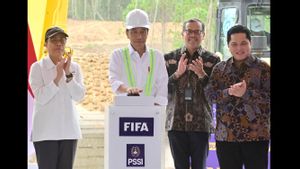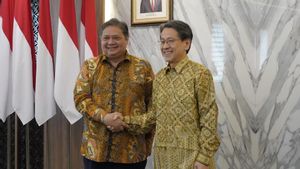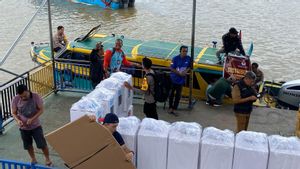JAKARTA - PT Food Station Tjipinang Jaya BUMD Pangan Pemerintah Provinsi DKI Jakarta was also present at the meeting between Rice Traders and Rice Milling (Perpadi) and the Minister of Agriculture of the Republic of Indonesia, located in the Ministry of Agriculture's Office, Building A Ministry of Agriculture, Tuesday, November 7.
A meeting with the Ministry of Agriculture in order to support the Ministry of Agriculture (Kementan) program which will encourage the growth of rice and corn production through the use of swampland throughout Indonesia.
Minister of Agriculture Andi Amran Sulaiman invites various parties to jointly build a brilliant and brilliant agricultural sector. He hopes that rice and corn production can achieve self-sufficiency.
"We have to do the road to self-sufficiency from now on to suppress import policies. So we have to be independent and stand on our own feet," he explained.
Chairman of Perpadi Sutarto Alimoeso said that Perpadi must support the policies and steps of the Ministry of Agriculture, such as increasing production through the use of swampland.
Sutarto also said that the collaboration between the government and rice pangolin entrepreneurs is very important to ensure that the production is running well. One of them is by revitalizing small-scale pangolins by utilizing the People's Business Credit (KUR) assistance service.
"We ask the Minister (Pertaniman) for how to make the small rice mills revitalized. One of the things we propose is of course give them the opportunity to get credit that is easy and cheap like KUR," he said.
Pamrihadi, President Director of PT Food Station Tjipinang Jaya expressed his hope in a meeting with the Minister of Agriculture at that time, namely that there was a limitation of production equipment for one business entity so that its production capacity was limited.
"So that large milling entrepreneurs do not kill small mills and can embrace small mills so that they can live, grow together," he said.
اقرأ أيضا:
Currently, out of tens of thousands of mills in Indonesia, it is estimated that they have an inlet rice production capacity (from raw materials) of Panen Dry Grain (GKP) of 94 million tons per year. However, the GKP production volume from farmers per year is estimated to be only 54 million tons, resulting in a fight over each other's raw materials between the rice mills.
For large milling entrepreneurs who have large capital and large engine capacity, of course, they will absorb a lot of raw materials from farmers in large quantities so that small mills do not get raw materials, which in the end they will go bankrupt.
Pamrihadi also said that he strongly supports the Ministry of Agriculture's policy to increase the volume of dry grain production through the convenience of providing subsidized fertilizers for farmers, providing KUR for national rice pangolin entrepreneurs and converting land into agricultural land.
The English, Chinese, Japanese, Arabic, and French versions are automatically generated by the AI. So there may still be inaccuracies in translating, please always see Indonesian as our main language. (system supported by DigitalSiber.id)
















